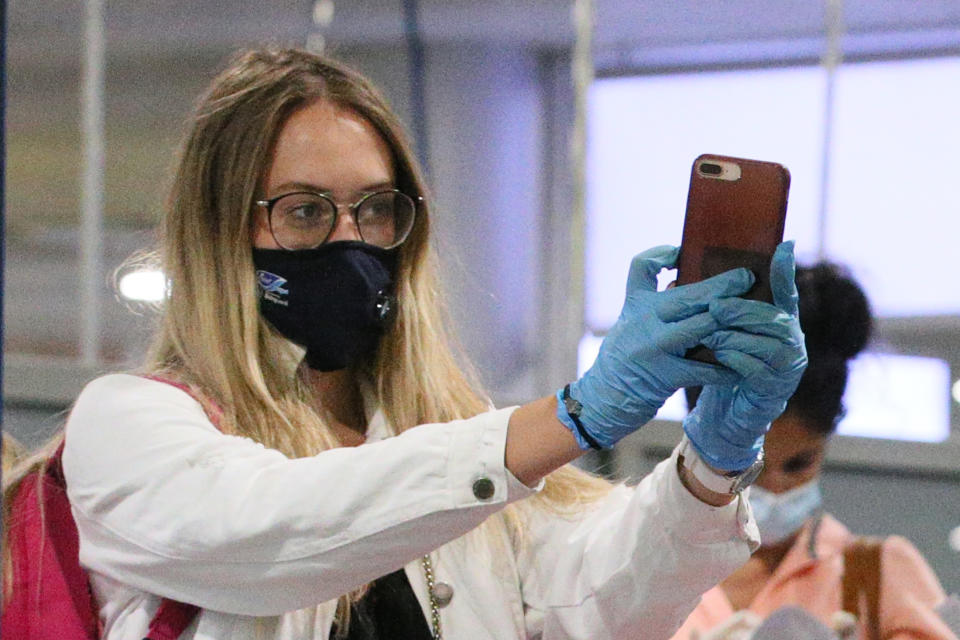'Just wash your hands': Doctor urges people not to wear gloves to ward off coronavirus

An unnamed doctor has urged people not to wear gloves in the hope of warding off the coronavirus.
The anonymous medic took to TikTok to warn his followers gloves can easily become contaminated, with “germs accumulating”.
When out and about, gloves could end up “more full of germs than your hand would have been” if you washed them regularly.
Read more: Coronavirus vaccine 'stimulates antibody and T-cell response'
He goes on to warn people may mistakenly touch their face with a contaminated gloved hand, enabling the coronavirus to enter the body via the eyes, nose or mouth.
Even removing gloves is a risk if done incorrectly, added the medic.
He closed with “just wash your hands, be sensible, stay safe”.
Gloves ‘not a substitute for washing your hands’
The doctor’s warning is not the first time experts have urged against relying on gloves to stay virus-free.
The coronavirus mainly spreads face-to-face via infected droplets that are expelled when a patient coughs or sneezes.
Evidence suggests the strain can also survive on surfaces, lingering for up to three days on plastic and stainless steel.
People could therefore mistakenly contaminate their gloved hands.
Read more: Coronavirus anxiety 'is fuelling anger' due to medical shortages
Humans are tactile beings. Gloves may therefore be brought up to the eyes, mouth or nose.
“If people cannot stop touching their face, gloves will not serve a purpose,” Dr Amesh Adalja from Johns Hopkins University previously said.
A 2015 study in the American Journal of Infection Control found people touch their face on average 20 times an hour.
To combat the infection, officials are urging the public to wash their hands regularly.
“Gloves are not a substitute for washing your hands,” said Dr Adalja.
French health minister Olivier Veran has also spoken out on the issue, saying: “If you're wearing gloves, you're not washing your hands.”
Research suggests gloves are effective in clinical settings, like hospitals.
This may be because doctors theoretically throw them away after every use, with the buildings also being disinfected regularly.
“There is little evidence to support the use of gloves outside of the clinical setting (e.g. treating a patient) to prevent becoming infected”, Dr Tom Wingfield from the Liverpool School of Tropical Medicine previously said.
Nevertheless, Professor David Heymann from the London School of Hygiene & Tropical Medicine has recommended anyone with confirmed or suspected coronavirus – and their carer – wear gloves, providing they are removed “properly”.
Read more: What is the coronavirus treatment being hailed a 'breakthrough'?
The US Centers for Disease Control and Prevention advises people grasp the outside of one glove at the wrist, without touching skin.
The glove should be peeled away so it turns inside out.
Holding the removed glove in the gloved hand, take off off the second glove by sliding the ungloved fingers under the glove, and peel it off so that too turns inside out.
Leave the first glove inside the second and throw both away; then wash your hands “immediately”.

What is the coronavirus?
The coronavirus is one of seven strains of a class of viruses that are known to infect humans.
Others include the common cold and severe acute respiratory syndrome (Sars), which killed 774 people during its 2002/3 outbreak.
Since it was identified at the end of 2019, more than 14.7 million cases have been confirmed worldwide, according to John Hopkins University.
Of these, over 8.3 million are known to have recovered.
The global death toll has exceeded 610,000.
Symptoms include fever, cough and a loss of taste or smell.
Although the coronavirus mainly spreads via coughs and sneezes, there is also evidence it can be transmitted in faeces.
While most cases are mild, pneumonia can come about if the infection spreads to the air sacs in the lungs, causing them to become inflamed and filled with fluid or pus.
The lungs then struggle to draw in air, resulting in reduced oxygen in the bloodstream and a build-up of carbon dioxide.
The infection itself has no “set” treatment, with most patients naturally fighting it off.
The steroid dexamethasone is being used in hospitals throughout the UK to reduce the risk of death among patients on ventilators or oxygen.
As well as hand washing, officials recommend people maintain social distancing.



